
ASUU strike: Grievances, controversies of interest heighten to push forth NLC Tuesday-Wednesday protest
…Controversies over payment system worsen
…SSANU, NASU decry bias over Briggs committee submisisons, reject salary recommendation
By Moses Adeniyi
Against dousing of tension and relaxing of grievances, more expression of dissatisfactions have continued to mount up with indications of spurring energy for mobilisation towards the planned protest by the Nigeria Labour Congress (NLC) slated for Tuesday 26th, and Wednesday 27th, July, 2022 to frown against the unresolved differences between the Federal Government and the Academic Staff Union of Universities (ASUU).
The NLC had on Sunday, 17th July, 2022, announced plans to commence a two-day nationwide protest slated for Tuesday, July 26, and Wednesday 27, July 2022, in solidarity with the ongoing strike action by striking university unions.
A circular issued to all the state chairmen of the NLC signed by the National President of the congress, Ayuba Wabba, had partly reads, “We bring you fraternal greetings from the national secretariat of the NLC. In line with the decisions of the National Executive Council meeting of the NLC held on June 30, 2022, we have scheduled as follows the National Days of Protest to get our children back to school and support our unions in Nigeria’s public universities fighting for quality education.”
Nigerian NewsDirect observed that NLC leadership will Monday (today) meet with leaders of ASUU and other aggrieved unions of public universities to finalise mobilisation plans for solidarity towards the scheduled date.
While mobilisation for the protest gathers momentum, as the government makes effort to forestall the protest, non teaching staff in the universities have lamented the submissions of the Professor Nimi Briggs 2009 Renegotiation Committee to the Federal Government, accusing the Committee of bias.
This is just as they called on the Federal Government to make public the results of the integrity tests carried out on the three payment platforms – the University Transparency and Accountability Solution (UTAS), the University Peculiar Personnel and Payroll System, U3PS and the Integrated Payroll and Personnel Information System (IPPIS) – payment systems which have formed issues of contest between the Federal Government and the Academic stakeholders.
The Joint Action Committee (JAC) of the Senior Staff Association of Nigerian Universities (SSANU) and the Non-Academic Staff Union of Allied and Education Institutions (NASU) has accused the Professor Nimi Briggs 2009 Renegotiation Committee of bias against the non teaching staff.
JAC decried that it was shocking to its members that while the Briggs Committee has not commenced discussions on salary review and other allowances in meeting, it received reports that the Committee had gone ahead to submit a report to the Federal Government recommending a 10 percent increase for the non-teaching unions.
JAC lamented that the Federal Ministry of Education had in the past absented itself from such meetings leading to poor follow-up action on the various Memoranda of Agreements signed.
“These absences of our employers have been a major albatross to all Memoranda of Action or Agreements as the case may be,” JAC held.
Rejecting “any salary recommendation that would cause a further disparity in the University system,” SSANU and NASU held “there is an already existing disparity in the system which we had always closed our eyes to.”
Briefing journalists in Abuja of its resolve, on the prolonged strike, the spokesman of JAC and General Secretary of NASU, Prince Peters Adeyemi mentioned that controversy over payment platform was one of the reasons the strike has lingered for too long and advised that the issue has to be resolved especially as the government has carried out integrity tests and other necessary tests on the three payment system under contest – UTAS, U3PS, IPPIS.
A communique read at the briefing which was signed by the National President of SSANU, Comrade Mohammed Ibrahim and Prince Adeyemi held that its findings on the activity of the Briggs Committee in the ongoing renegotiation especially on welfare package was a betrayal of confidence.
“This address is coming on the heels of the recent revelations and development arising from the ongoing national strike embarked upon by the various University based unions.
“The revelations leave a sour taste in the mouth and given the incendiary and combustible excitement and tensions which the developments have generated amongst our members, we feel compelled to make our position known on the status of our negotiations with the Federal Government on the ongoing industrial action.”
It noted that the tripartite plus meeting convened on 12th May by President Muhammadu Buhari had resolutions such as renegotiations of the FGN/2009 Agreements signed with the university based unions and the integrity tests for the proposed payment platforms from ASUU, the JAC of NASU and SSANU and the existing platform of Integrated Payroll and Personnel Information System (IPPIS) by the National Information Technology Development Agency (NITDA).
Decrying that the Briggs committee failed to carry non-teaching staff along, JAC lamented, “Following the inauguration of the Committee, so far the two unions of NASU and SSANU had only two meetings with the committee. After the first meeting, the two unions of NASU and SSANU independently was compelled to create the impression that the Committee appeared not to have had its mandates clearly spelt out by the government.
“It needs being pointed out that at the two meetings held with the Briggs committee by both unions, there were no deliberations on salary increment and allowances.
“While the NASU and SSANU teams had presented Memorandum of Demands that included proposal for salary review along with appropriate salary tables, the committee had pleaded that the two unions should take the issue of review of salaries and allowances last because they were still interfacing with the relevant government agencies to give them appropriate offers to counter our proposals on salary review.
“It is therefore shocking to say the least that while we have not even commenced discussions on salary review and other allowances, we received reports that the committee had gone ahead to submit a report to the Federal Government recommending a 10 percent increase for non-teaching unions.
“This we find to be very unfortunate and a betrayal of confidence by the committee. While it may be easy to dismiss this information as rumor, our belief is confirmed by the fact a report was truly submitted to the Federal Government.
“The Honourable Minister of Labour and Employment in his various statements had exposed the fact that a report had been prepared and presented to the Federal Government by the Briggs Committee.
“While we place on record, our appreciation and commendation to the Honourable Minister of Labour and Employment and his team, for always filling the gap and making efforts to intercept industrial disputes, it should also be placed on record that the Federal Ministry of Education had in the past absented itself from such meetings leading to poor follow-up action on the various Memoranda of Agreements signed.
“These absences of our employers have been a major albatross to all Memoranda of Action or Agreements as the case may be.
“It is to the commendation of the current Permanent Secretary of the Federal Ministry of Education, that since he assumed that office, the Ministry has been markedly more responsive to matters affecting the Unions.
“Let it be stated clearly, that SSANU and NASU reject any salary recommendation that would cause a further disparity in the University system. There is an already existing disparity in the system which we had always closed our eyes to.
“To further expand that disparity would be invitation to the greatest level of anarchy and industrial unrest ever witnessed in the University system.”
On the payment platform, JAC said, “We commend the National Information Technology Development Agency (NITDA) for the painstaking labor in undertaking the assignments so far.
“The deliberations at NITDA on the test cases of the three payment platforms-IPPIS, UTAS, and U3PS have been transparent and open so far.
“We urge NITDA to accelerate the results processing and come up with its indicator to lay to rest the contentious issues of a viable and enduring payment platform best suited for the Nigerian university system.”
Public universities in the Country came under lock and key over five months owing grievances on the part of the university stakeholders which the Federal Government has not been able to resolve.
The strike which commenced on the instance of ASUU on February 14, 2022 as a warning strike, has degenerated into an indefinite one which has lasted over five months.
The union had accused the government of failing to honour and implement the Memorandum of Understanding and Memorandum of Action signed between both parties in 2020 – an agreement that was reached to end a nine months old strike by ASUU in 2020.
Other issues of contention include the government’s poor commitment to the payment of academic earned allowances and the continued use of the IPPIS.
Also, is the grievances of the academic stakeholders over the refusal of the government to adopt the UTAS, as recommended substitution for IPPIS, and the proliferation of universities in the country.
Grievances by other stakeholders in the nation’s public university system had seen more unions including the National Association of Academic Technologists (NAAT), the Senior Staff Association of Nigeria Universities (SSANU) and the Non-Academic Staff Union of Educational and Associated Institutions (NASU), joining up in the strike.
Issues bordering on Renegotiation of 2009 Agreement, controversy on the salary payment platform among others, were causes at stake.
While ASUU has opted for UTAS as its preferred payment platform, SSANU and NASU proposed the U3PS; submissions which the Federal Government has displayed its hostilities against, preferring its current payment platform of IPPIS.
The Federal Government through NITDA had subjected the three payment platforms to integrity tests to determine their suitability.



